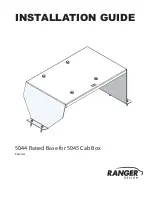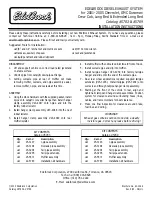
194
SAFETY
There are different sizes and types of restraints
for children from newborn size to the child
almost large enough for an adult safety belt.
Always check the child seat Owner’s Manual to
make sure you have the correct seat for your
child. Carefully read and follow all the
instructions and warnings in the child restraint
Owner’s Manual and on all the labels attached
to the child restraint.
Before buying any restraint system, make sure
that it has a label certifying that it meets all
applicable Safety Standards. You should also
make sure that you can install it in the vehicle
where you will use it.
NOTE:
For additional information, refer to http://
www.nhtsa.gov/parents-and-caregivers or
call: 1–888–327–4236
Canadian residents should refer to Transport
Canada’s website for additional information:
http://www.tc.gc.ca/en/services/road/
Summary Of Recommendations For Restraining Children In Vehicles
Child Size, Height, Weight Or Age
Recommended Type Of Child Restraint
Infants and Toddlers
Children who are two years old or younger and
who have not reached the height or weight limits
of their child restraint
Either an Infant Carrier or a Convertible Child
Restraint, facing rearward in a rear seat of the
vehicle
Small Children
Children who are at least two years old or who
have outgrown the height or weight limit of their
rear-facing child restraint
Forward-Facing Child Restraint with a five-point
Harness, facing forward in a rear seat of the
vehicle
Larger Children
Children who have outgrown their forward-facing
child restraint, but are too small to properly fit
the vehicle’s seat belt
Belt Positioning Booster Seat and the vehicle
seat belt, seated in a rear seat of the vehicle
Children Too Large for Child Restraints
Children 12 years old or younger, who have
outgrown the height or weight limit of their
booster seat
Vehicle Seat Belt, seated in a rear seat of the
vehicle
21_LX_OM_EN_USC_t.book Page 194
















































